What kind of training do auto mechanics receive?
Auto technician training is essential for becoming a proficient expert. It covers both theoretical and practical skills. With the automotive industry’s rapid growth and the rising complexity of car technology, technicians must acquire a diverse set of repair and maintenance abilities. Engine basics, electrical systems, diagnostics, and safety standards are commonly included in training to assist technicians in overcoming numerous problems and ensuring vehicle reliability. For newcomers, solid training not only improves job competitiveness but also lays the groundwork for future progress.
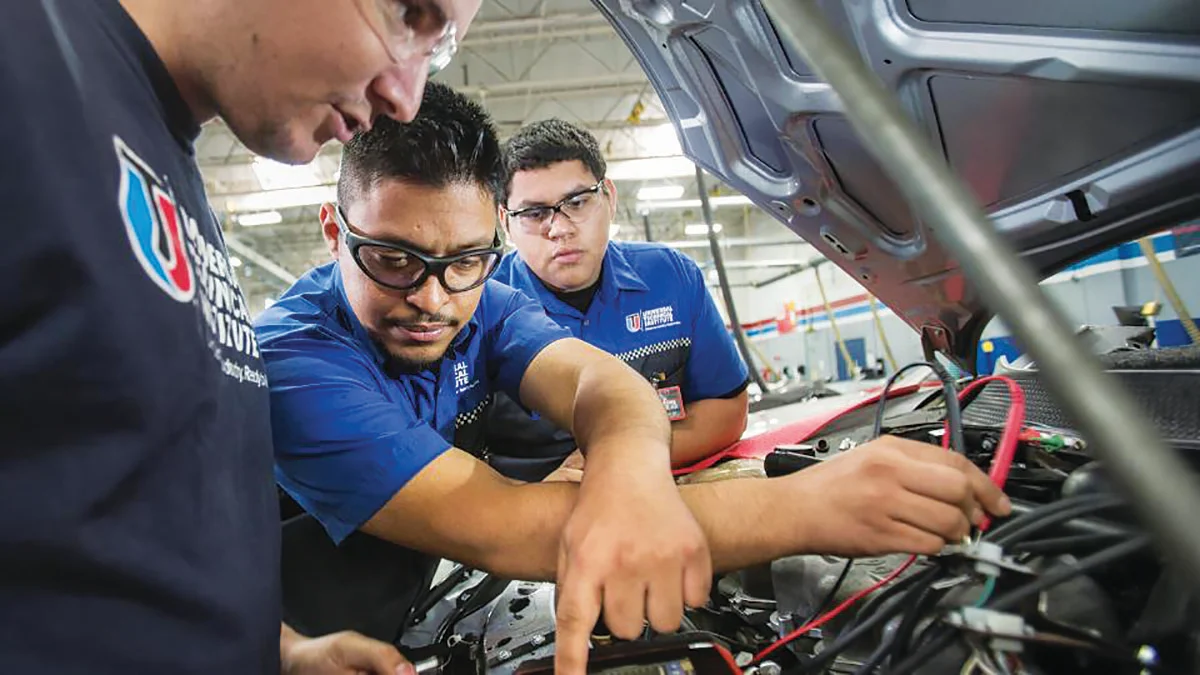
1. Why is automotive technician training so important?
Automotive technicians play an important part in today’s automotive industry. As automotive technology improves, they are responsible for more than just maintaining and repairing traditional automobiles; they must also cope with the complicated systems of electronic, hybrid, and electric vehicles. As a result, rigorous training has become critical to increasing technicians’ professionalism, not only to assure efficiency but also to improve overall safety.

1.1 Complexity of automotive industry raises training requirements for technicians
1.1.1 Rapid changes in automobile manufacturing technology
With automotive technology advancing quickly, technicians need to stay up-to-date with the latest systems and standards. Modern cars are now built with advanced electronic components and automation features, which demand a higher level of understanding and skill from technicians.
1.1.2 Popularization of technologies such as new energy vehicles and hybrid power systems
The rise of electric and hybrid vehicles is expanding technician skills beyond traditional combustion engines to include battery management, regenerative braking systems, and more. Technicians now need specialized knowledge to effectively service these new power systems.

1.2 Technical training improves efficiency and safety
1.2.1 How training reduces the risk of accidents and improves maintenance efficiency
Technical training helps technicians work more safely and efficiently. By learning systematic approaches to problem-solving, technicians can quickly and accurately identify issues, minimizing unexpected risks during repairs. Additionally, proper training enables technicians to handle a variety of complex repairs with confidence, enhancing overall productivity.
1.2.2 The Impact of Training on Customer Satisfaction
High-quality training not only improves the quality of repairs but also builds customer trust. Well-trained technicians can address customer concerns quickly and effectively, leading to higher satisfaction with the service experience. This ability to deliver prompt, reliable service leaves a lasting positive impression on customers, increasing their confidence in the technician’s skills and the overall service quality.

2. Basic Training for Automotive Technicians
Before becoming qualified, new automotive technicians undergo comprehensive foundational training that builds solid theoretical and practical skills. From understanding engine principles to hands-on tool use, this training prepares technicians for a range of routine repairs. Studies show that technicians who complete systematic training see about a 30% boost in work efficiency and significantly reduce diagnostic errors.
2.1 Theoretical Knowledge Training
2.1.1 Fundamentals of Engines, Transmission Systems, and Electrical Circuits
Theory is essential for technicians to understand the core components of a vehicle. Training covers how the engine operates, the principles behind the transmission system, and the structure of complex vehicle electrical circuits.
2.1.2 Learning Operational and Safety Standards
Understanding industry safety standards is equally important, helping technicians avoid unnecessary risks during repairs. According to the American Automobile Association, technicians trained in safety standards can reduce accident risks by up to 40%, enabling them to work with greater confidence.
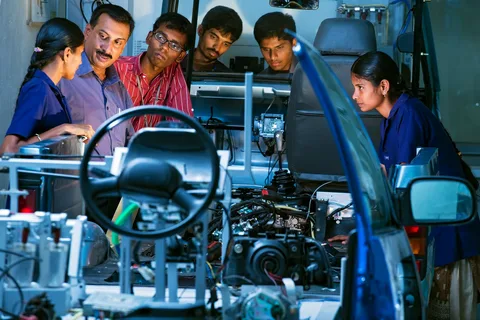
2.2 Practical Skills Training
2.2.1 Proper Use of Repair Tools
Practical training teaches technicians how to use essential repair tools, such as torque wrenches and jacks. Technicians skilled with tools experience about a 25% increase in repair efficiency.
2.2.2 Basic Mechanical and Electrical Diagnostics
Diagnosing issues is a core skill, and through training, technicians learn to identify and fix common mechanical and electrical problems. Well-trained technicians achieve diagnostic accuracy rates above 85% in daily tasks.
2.2.3 Vehicle Maintenance and Common Problem-Solving
Routine maintenance tasks like oil changes, brake checks, and tire inspections are also covered, as these services make up over 60% of repair work. Proficiency in these tasks ensures technicians can handle the majority of customer needs effectively.
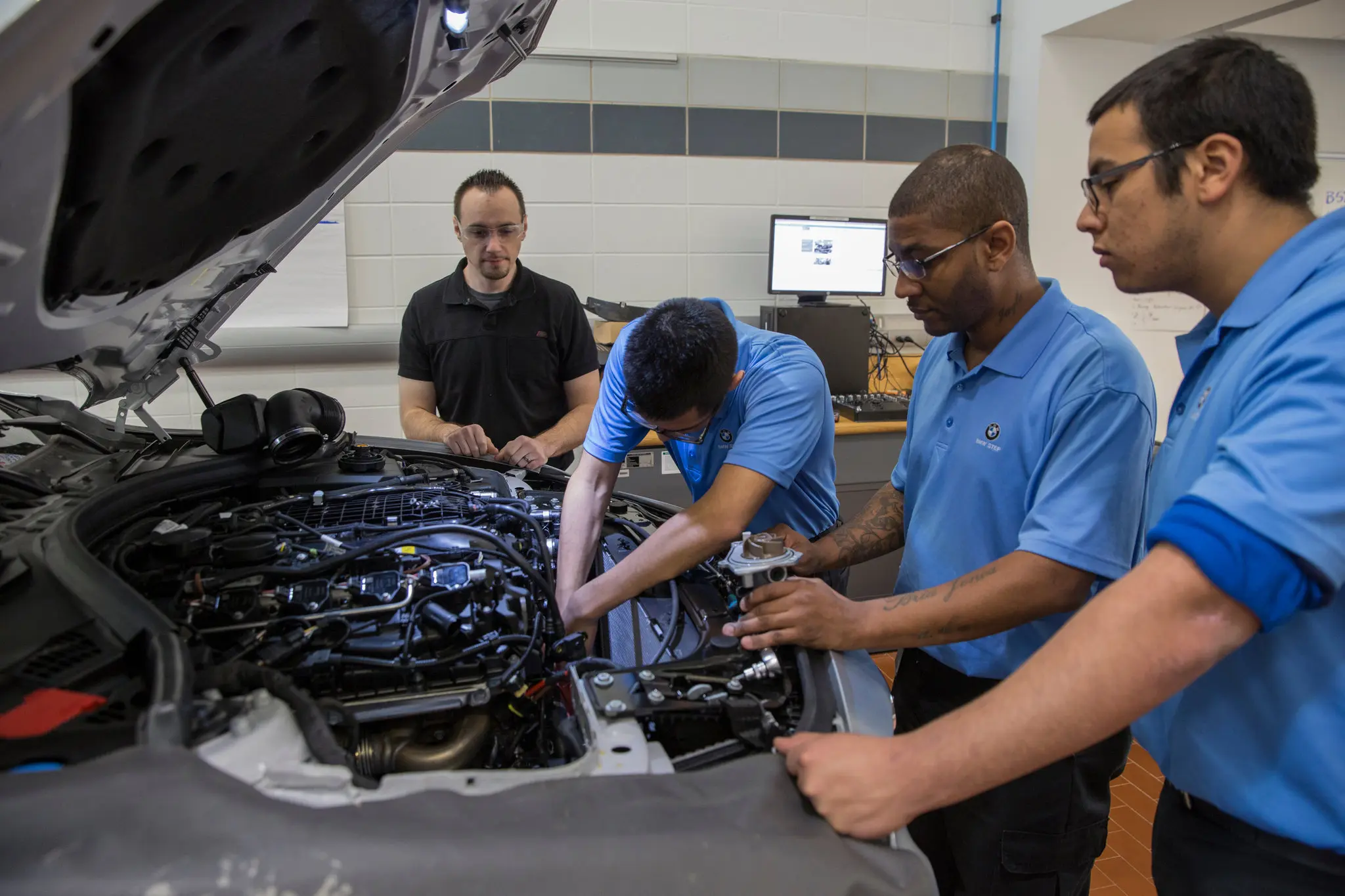
3. Advanced Training for Modern Automotive Technicians
As automotive technology rapidly advances, technicians need to keep their skills up-to-date to handle more complex systems. Advanced training helps them stay competitive, equipping them with knowledge of the latest vehicle technologies and improving diagnostic accuracy and efficiency. Key areas in advanced training include:
3.1 Electrical and Electronic Systems Training
3.1.1 Electric and Hybrid Vehicle Systems
With the rise of electric (EV) and hybrid (PHEV) vehicles, technicians must understand these advanced power systems. Unlike traditional engines, EVs involve battery management, charging systems, and regenerative braking. Advanced training covers skills for handling battery issues and maintaining electric drivetrains to keep these systems running smoothly.
3.1.2 Advanced Sensors and Electronic Control Units (ECUs)
Modern cars are packed with sensors and ECUs that control everything from engine performance to safety systems. Advanced training shows technicians how to diagnose and repair these intricate electronic systems, including sensors used in collision avoidance and driver assistance technologies.
3.1.3 Fault Codes and Data Analysis
As cars become more digital, reading and interpreting fault codes is an essential skill. Technicians learn to work with on-board diagnostics (OBD) systems, using fault code readers and analyzing system data to pinpoint issues, thus enhancing repair accuracy and efficiency.
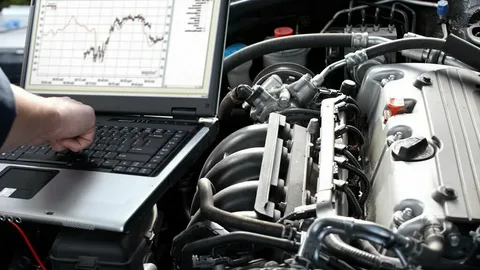
3.2 Diagnostic and Troubleshooting Training
3.2.1 Diagnostic Equipment and Software
Modern vehicle troubleshooting relies on diagnostic tools and software. Advanced training provides technicians with hands-on experience in using scanning tools, computers, and specialized software to quickly and accurately identify potential issues, especially within complex electrical systems.
3.2.2 Data Analysis for Complex Problems
Sometimes, fault codes alone aren’t enough. Advanced training teaches technicians how to interpret vehicle data, sensor feedback, and other indicators to trace the root cause of issues—particularly critical for high-tech vehicles that require precision adjustments.
3.2.3 Adapting to New Tools and Techniques
As automotive technology evolves, so do diagnostic tools and repair methods. Staying updated with new tools and techniques is crucial, and advanced training ensures technicians can tackle the latest challenges. Continuous education and annual skill refreshers help maintain their proficiency and adaptability.Through advanced skills training, technicians gain the expertise to manage the increasing complexity of modern vehicles, enhancing their professional competence and ensuring vehicle safety and efficiency.
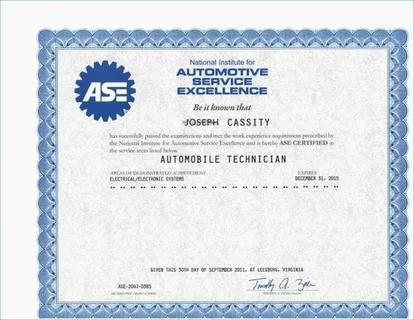
4. Technical Certifications and Qualifications
In the auto repair industry, professional certifications and qualifications are essential for a technician’s career growth. These certifications validate a technician’s skills and expertise, making them more competitive in the job market. Here’s a look at some common certifications and how they can help technicians advance in their careers.
4.1 ASE Certification
4.1.1 Global Recognition of ASE Certification
The ASE (Automotive Service Excellence) certification is one of the most recognized credentials in the automotive repair field, especially in the U.S. and internationally. It demonstrates a technician’s ability to handle complex automotive issues and serves as a key benchmark for quality service. According to the U.S. Bureau of Labor Statistics, over 60% of repair shops require ASE certification, highlighting its industry significance.
4.1.2 Specialized Certifications for Areas Like Transmissions and Diesel Engines
ASE offers specialized certifications covering specific areas such as transmissions, diesel engines, and electrical systems. Technicians can choose certifications that align with their skills or interests, adding to their expertise. For example, a diesel engine certification opens career opportunities in commercial and heavy-duty vehicle repair.
4.2 Importance of Professional Certifications
4.2.1 Recognition of Technical Ability
Earning relevant technical certifications validates a technician’s skills and knowledge, demonstrating their capability to employers and customers alike. For high-skill repair jobs, certifications are often the benchmark for ability, and certified technicians frequently receive higher pay and more job offers.
4.2.2 Essential for Career Advancement
For technicians aiming to excel, certifications are crucial for career growth. As automotive technology evolves, new certifications and training courses continually emerge. By staying certified, technicians remain competitive and position themselves for promotions to roles like senior technician, shop supervisor, or service manager. Certification also builds customer trust, potentially increasing business.Certifications not only validate a technician’s skills but also open doors to more career opportunities, making them a valuable asset in the automotive industry.
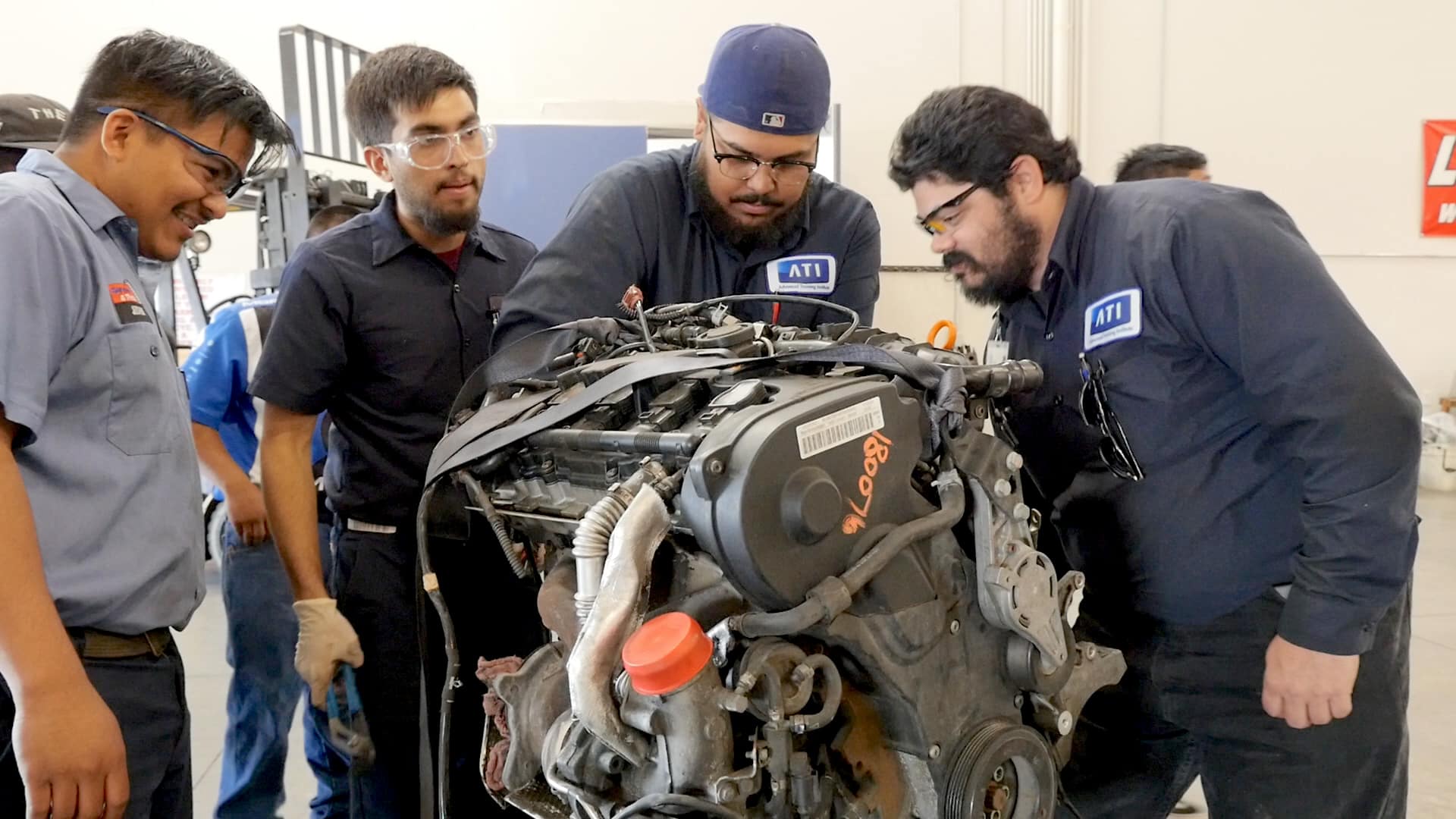
5. Continuing Education and Training Trends for Auto Technicians
As automotive technology advances rapidly, technicians must continually update their knowledge and skills. Continuing education and training have become essential to keeping up with these changes. Here are some key trends in auto technician training that help enhance their professional competencies.
5.1 Online Learning and Virtual Training
5.1.1 Convenience of Online Courses and Video Tutorials
With the rise of internet technology, online learning has become a major resource for technicians. Online courses and video tutorials offer flexible scheduling, enabling technicians to learn at their own pace, especially useful for those with limited access to traditional in-person classes. A survey shows that 70% of technicians find online platforms effective for learning new skills and staying updated.
5.1.2 Use of VR and AR in Training
Virtual reality (VR) and augmented reality (AR) are increasingly applied to technician training, simulating real-world repair environments for an immersive experience. Through VR and AR, technicians can practice diagnostics and repairs on virtual vehicle systems, gaining hands-on experience without risking real-world errors. By 2025, about 30% of auto training courses are expected to incorporate VR technology.
5.2 Manufacturer-Sponsored Technical Training
5.2.1 Training on New Equipment Provided by Manufacturers
As automakers innovate, manufacturers frequently offer training on new models and advanced equipment. Courses from companies like Tesla and Mercedes train certified technicians to use the latest diagnostic tools and handle specialized systems. Partnering with manufacturers helps technicians stay aligned with industry advancements.
5.2.2 Real-Case Studies and Diagnostic Simulations
Many manufacturers also offer case studies and diagnostic simulations, allowing technicians to analyze complex, real-world repair issues. These practical courses include troubleshooting, system analysis, and solution implementation, improving technicians’ problem-solving skills and efficiency. Such “hands-on” training is now vital for servicing high-end and intelligent vehicles.As technology and market demands evolve, continuing education and manufacturer-backed training will remain essential for boosting technicians’ competitiveness, helping them deliver professional, efficient service to customers.
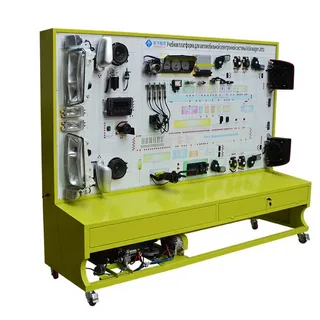
6. Importance of Choosing Quality Automotive Training Equipmen and Institutions
As automotive technology advances, selecting high-quality automotive training equipment and institutions is essential. Quality training resources not only enhance technicians’ skills but also strengthen their ability to tackle technical challenges. Here’s why investing in top-notch equipment and institutions is critical for technician development.
6.1 Improving Training Outcomes with Professional Equipment
6.1.1 Real-World Simulation for Hands-On Practice
High-quality training equipment provides realistic simulation environments, allowing trainees to practice in conditions that mirror real-life scenarios. With tools like automotive electrical system simulators, trainees can safely perform diagnostics and repairs, building practical skills in a risk-free setting.
6.1.2 Hands-On Experience with Advanced Diagnostic Tools
Using premium equipment, trainees can gain experience with modern diagnostic tools essential for automotive repair, such as OBD scanners and fault diagnostic devices. These tools help technicians identify issues quickly and implement effective solutions, boosting both their efficiency and service quality.
7. Conclusion: The Future of Automotive Technician Training
As automotive technology advances, technician training remains crucial. With the rise of electric and smart cars, as well as advanced diagnostics, continuous skill updates are essential. In the future, online learning, virtual training, and partnerships with manufacturers will drive more efficient and targeted training. For those entering this field, automotive technician roles offer both technical challenges and opportunities for ongoing career growth.

